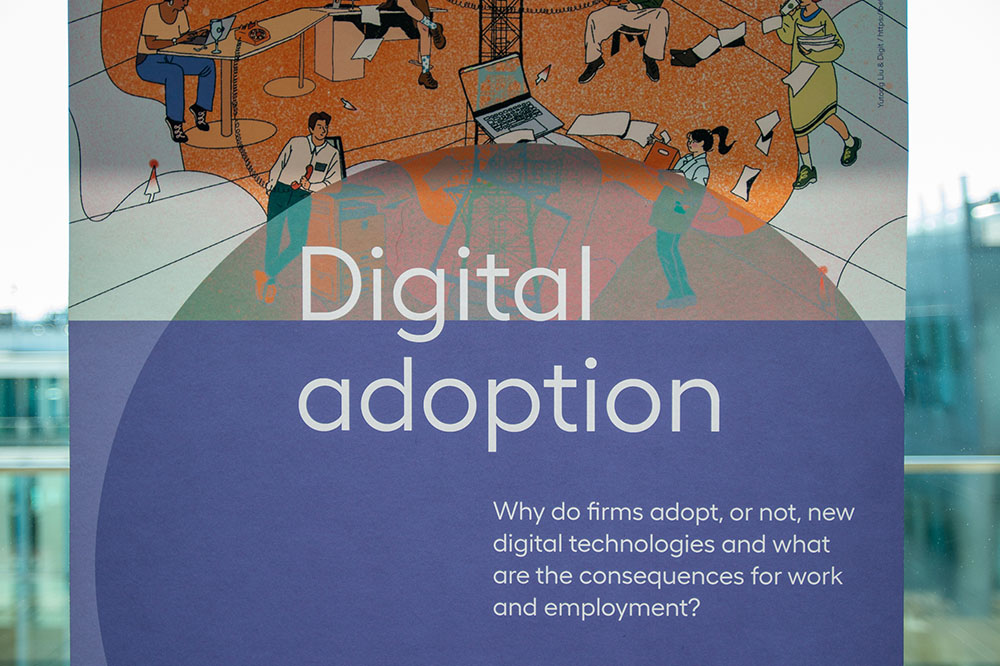Overview
A global digital transformation of work is underway, with governments and organisations keen to harness the potential benefits of AI and other digital technologies to drive productivity and growth. The ESRC Centre for Digital Futures at Work (Digit) co-led by Sussex and Leeds universities, is providing critical evidence into the nature of this transformation and its impacts on governments, employers, workers and jobseekers.
Its research is already delivering real-world impact, including through insight into the economic impacts of labour laws; influencing the adoption of agile working in the NHS; and in a large trial of the four day week that illustrates how technology adoption can improve both productivity and worker wellbeing.
The Challenge
The Government’s Industrial Strategy sets out its ambitions for innovation-led growth, backed by policies aimed at driving technology adoption across key sectors. Advances in AI and other technologies have potential to transform jobs and livelihoods, but how can we ensure that the economic and societal benefits are realised and widely shared?
The ESRC Centre for Digital Futures at Work is exploring this question, examining the challenges, opportunities, risks, and benefits of the ongoing digital transformation of work. Through its research, it aims to understand the evolving digital work ecosystem and generate new knowledge that can inform changes in policy and practice, against a background of rapid technological change.
Partnerships
Digit is a significant academic collaboration, jointly led by the University of Sussex and Leeds Business Schools, with academic partners at the universities of Cambridge, Manchester, the Institute of Development Studies, and Monash University in Australia. The Centre also includes non-academic partners FutureDotNow, a coalition of business leaders working to tackle the digital skills gap, and research and development organisation, the Institute for the Future of Work, secretariat to the All-Party Parliamentary Groups (APPG) on the Future of Work.
Alongside this, Digit has established a new forum, the Digit CoLab, to embed stakeholder perspectives in its research. Through annual meetings and ongoing dialogue, the CoLab will inform research and share cutting-edge evidence and insights.
Our Research
Supported by two major UKRI ESRC grants since 2020, Digit’s research is challenge-led and impact oriented. Its current second phase research programme (2025-29) includes a third major, nationally representative survey tracking employers’ adoption of new digital technologies at work alongside an innovative programme of qualitative case study research in the UK and abroad. It focuses on five key themes:
- Digital ecosystem governance: How can key actors shape evolving digital work ecosystem?
- Digital adoption: Why do firms adopt, or not, new digital technologies and with what consequences?
- Skills and rewards: How is demand for digital skills evolving and what are the implications?
- Healthy working lives: How does digitalisation of work affect inclusive access to healthy working lives?
- Environment and location: How will digitalisation impact jobs, regional development, and the environment?
Our impact
Research from Digit’s first ESRC-funded, five-year research programme (2020-25) is already informing changes in policy and practice, including:
Analysis of the economic impacts of changes in labour regulation over fifty years has informed debates on potential impacts of the Employment Rights Bill.
Research on the four-day week won the 2024 ESRC Prize for Outstanding Business and Enterprise Impact, demonstrating how technology adoption can improve both productivity and employee wellbeing.
An ongoing collaboration with the NHS, agiLab, is influencing best practice in agile working across the NHS and was nominated as an ‘Innovation that Inspires’ by Association to Advance Collegiate Schools of Business.
Praise for the centre’s work summarised in the Digital Dialogues report:
“This report clearly demonstrates the vital role Digit is playing in how we understand the impact of digitisation on our workforce.”
Liz Williams MBE, Chief Executive, FutureDotNow
“This research speaks directly to the challenge of our time: How do we ensure everyone benefits from digital and emerging technologies?”
Helen Milner, OBE, Group Chief Executive, Good Things Foundation
“This fascinating research highlights the critical need for businesses to strategically invest in digital skills and inclusive practices to best navigate digitisation in the workplace, ensuring they remain competitive whilst also addressing emerging inequalities and effective workforce engagement.”
Emma Humphreys, Partner (UK), Eversheds Sutherland
“The research provided valuable insights on how we can leverage technology for good, using it as an enabler for inclusion and harnessing the talents of everyone. Organisations play a crucial role in bridging the digital skills divide.”
Carl Clarke, Director Learning, Talent, Leadership, Skills & People Performance, Vodafone
“This report highlights Digit’s work to date and paints a worrying picture of a UK digital ecosystem which is fragmented, and application that is very inconsistent and lags other countries. Furthermore, it points to growing inequalities in digital skills and rewards, and more broadly to the unequal impact on opportunities for good jobs and healthy working lives which not only persist but could get worse. These are hugely important findings which need to be understood and addressed to ensure we are driving a positive future of work.”
Peter Cheese, Chief Executive CIPD
“The new data on adoption, jobs and skills impacts are important contributions for the discussion around future collective bargaining, policy development and labour market reform.”
Baker Khundakji, International Transport Workers Federation Youth and Future of Work Officer




